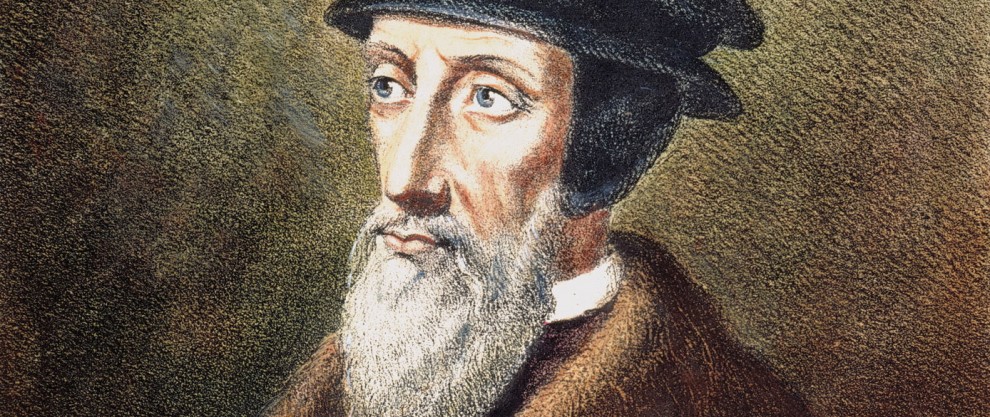John Calvin (born 1509, died this day, May 27, in 1564) didn’t want to be a celebrity. He even tried his best to avoid taking a leading role in the second generation of the Reformation. When his death was approaching, he arranged to have himself buried in an unmarked grave to make sure nobody would come venerate his relics.
And though he produced a heavy shelf of books and commentaries, he had very little to say about his own biography. Compare that to Martin Luther, who had quite a bit to say, in print, about his upbringing, his own tastes, his family background, and other such biographical details. For Calvin’s part, his most revealing autobiographical comments can be found in the preface to his Psalms commentary. And even then he has an exegetical reason for sharing about himself: the personality of David is stamped so prominently on the Psalter that Calvin considers a personal reflection not only permissible but helpful. After explaining how he came to write on the Psalms, he takes a moment to reflect on how he gained insight into this book because he feels sympathy with David: “For although I follow David at a great distance, and come far short of equaling him; or rather, although in aspiring slowly and with great difficulty to attain to the many virtues in which he excelled, I still feel myself tarnished with the contrary vices; yet if I have any things in common with him, I have no hesitation in comparing myself with him.”
He then reflects on his calling to the pastorate: “When I was as yet a very little boy, my father had destined me for the study of theology. But afterwards when he considered that the legal profession commonly raised those who followed it to wealth this prospect induced him suddenly to change his purpose. Thus it came to pass, that I was withdrawn from the study of philosophy, and was put to the study of law. To this pursuit I endeavored faithfully to apply myself in obedience to the will of my father; but God, by the secret guidance of his providence, at length gave a different direction to my course. And first, since I was too obstinately devoted to the superstitions of Popery to be easily extricated from so profound an abyss of mire, God by a sudden conversion subdued and brought my mind to a teachable frame, which was more hardened in such matters than might have been expected from one at my early period of life.”
Calvin relates the story of his being pressed (almost bullied) into the ministry, and reports on how often he has been attacked by opponents. Though these afflictions have been minor compared to David’s they are nevertheless of the same kind. And that has helped him in understanding the Psalms:
This knowledge and experience have been of much service in enabling me to understand The Psalms, so that in my meditations upon them, I did not wander, as it were, in an unknown region. My readers, too, if I mistake not, will observe, that in unfolding the internal affections both of David and of others I discourse upon them as matters of which I have familiar experience. Moreover, since I have labored faithfully to open up this treasure for the use of all the people of God, although what I have done has not been equal to my wishes, yet the attempt which I have made deserves to be received with some measure of favor. Still I only ask that each may judge of my labors with justice and candour, according to the advantage and fruit which he shall derive from them.
Calvin is a great example of self-effacing humility, especially as an author. It is remarkable that he could write so much and say so little about himself. But it is also remarkable that he rightly perceived that a good commentator on David’s Psalms is not allowed to keep himself out of the picture. The Psalms are uniquely self-involving literature, and only a person who is willing to put his name in print, his reputation on the line, and his life in the balance is behaving as he should toward the Psalms and his readers. And that’s the reason, practically the only reason, that we have a few lines of Calvin’s autobiographical musings.
